
Like They Own The Place
March 21st, 2014
I have a soft spot for grackles. Common Grackles, that is: the typical North American variety. I love their iridescent bronze and blue and purple highlights. To attract a mate, a male puffs out his plumage to catch the light and utter a little call that sounds for all the world like a rusty hinge. I like the sound: it's a harbinger of spring, and, well, it's cute. I like Boat-Tailed Grackles too, the king-size coastal variety of grackles I meet when I visit the Outer Banks with my parents. I often see them wading in the surf, pulling mole crabs up out of the sand.
But Great-Tailed Grackles...well, they're handsome too, but they're also kind of obnoxious!
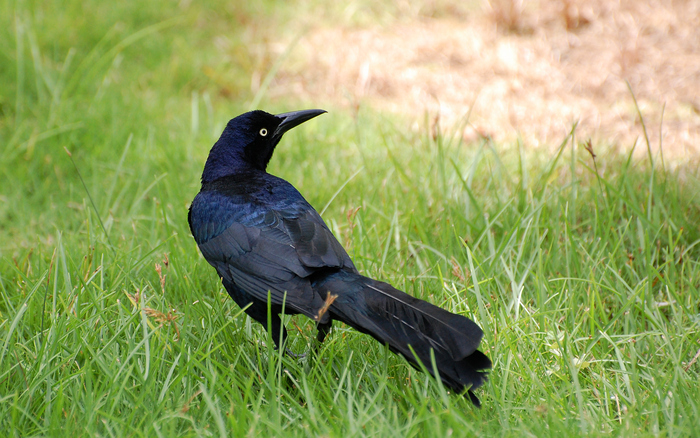
1680x1050 wallpaper
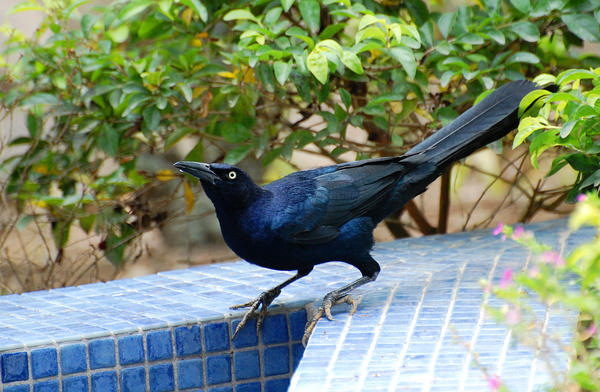
I will swear before God and man that no creature on earth makes as much noise as a Great-Tailed Grackle. I'd bet when a non-birder arrives at Pueblo Real and hears the overwhelming din, they assume the trees must be dripping with a variety of exotic tropical birds making all those loud, weird and different sounds. No, it's mainly grackles. (Well, that and the kiskadees, which I'll get to next!) They have a zillion different calls and none of them are melodious. You can't even get them to shut up at night. There was a big shade tree down the road that they liked to roost in. All you had to do was walk by, even hours past dusk, and they would awake with a cacophony of car alarm, blaring fire engine, honking horn sound effects. My theory is that Great-Taileds listen to the variety of noises produced by human society (with which they are usually in close association), and pick the loudest and most annoying of them to incorporate into their repertoire.
Don't take my word for it, listen for yourself. Like that, only a lot more so. I imagine it had something to do with the beginning of breeding season. (For many Costa Rican resident birds, that's right about now. That way it will be the rainy season by the time they have young in the nest, and the rain will bring plenty of insects to feed their brood.) All around the garden, they and others were gathering nest material, defending territories and flirting with the ladies. The grackle approach to courtship involved mainly strutting, chasing females around, and posturing before them with feathers puffed out and trembling. And making noise. Down the road, I even ran into a sort of grackle lek, with a group of males gathered together in a clearing posturing at each other.
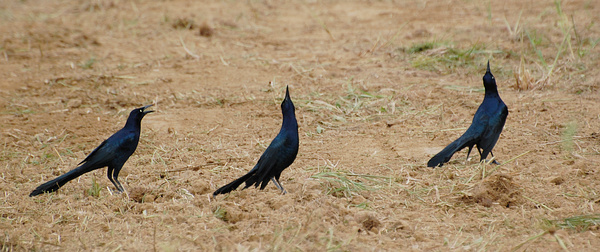
The Great-Tailed Grackles basically had the run of the resort. The indoors may have been ours, but the grounds were theirs; we were just visitors whom they graciously tolerated. They loved to bathe in the big fountain out front. But if that was occupied, the swimming pool would do! I watched as one hopped up on the poolside bar, then carefully hopped down onto one of the stools in the water.
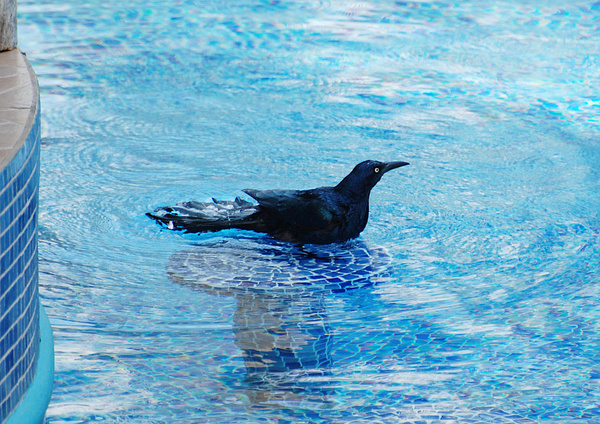
Female Great-Taileds are a good deal smaller and browner than the males, but otherwise just as grackly.
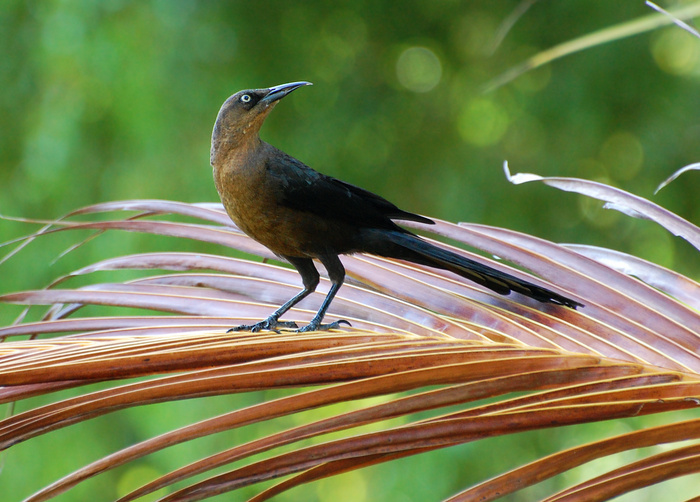
March 21st, 2014
I have a soft spot for grackles. Common Grackles, that is: the typical North American variety. I love their iridescent bronze and blue and purple highlights. To attract a mate, a male puffs out his plumage to catch the light and utter a little call that sounds for all the world like a rusty hinge. I like the sound: it's a harbinger of spring, and, well, it's cute. I like Boat-Tailed Grackles too, the king-size coastal variety of grackles I meet when I visit the Outer Banks with my parents. I often see them wading in the surf, pulling mole crabs up out of the sand.
But Great-Tailed Grackles...well, they're handsome too, but they're also kind of obnoxious!

1680x1050 wallpaper

I will swear before God and man that no creature on earth makes as much noise as a Great-Tailed Grackle. I'd bet when a non-birder arrives at Pueblo Real and hears the overwhelming din, they assume the trees must be dripping with a variety of exotic tropical birds making all those loud, weird and different sounds. No, it's mainly grackles. (Well, that and the kiskadees, which I'll get to next!) They have a zillion different calls and none of them are melodious. You can't even get them to shut up at night. There was a big shade tree down the road that they liked to roost in. All you had to do was walk by, even hours past dusk, and they would awake with a cacophony of car alarm, blaring fire engine, honking horn sound effects. My theory is that Great-Taileds listen to the variety of noises produced by human society (with which they are usually in close association), and pick the loudest and most annoying of them to incorporate into their repertoire.
Don't take my word for it, listen for yourself. Like that, only a lot more so. I imagine it had something to do with the beginning of breeding season. (For many Costa Rican resident birds, that's right about now. That way it will be the rainy season by the time they have young in the nest, and the rain will bring plenty of insects to feed their brood.) All around the garden, they and others were gathering nest material, defending territories and flirting with the ladies. The grackle approach to courtship involved mainly strutting, chasing females around, and posturing before them with feathers puffed out and trembling. And making noise. Down the road, I even ran into a sort of grackle lek, with a group of males gathered together in a clearing posturing at each other.

The Great-Tailed Grackles basically had the run of the resort. The indoors may have been ours, but the grounds were theirs; we were just visitors whom they graciously tolerated. They loved to bathe in the big fountain out front. But if that was occupied, the swimming pool would do! I watched as one hopped up on the poolside bar, then carefully hopped down onto one of the stools in the water.

Female Great-Taileds are a good deal smaller and browner than the males, but otherwise just as grackly.

| ← | → |

Mike
March 22nd, 2014 at 10:16 am
They are quite striking; I like the flash of blue as they fly by. Some nice shots there... I guess there were enough of them around to offer lots of opportunities, eh?